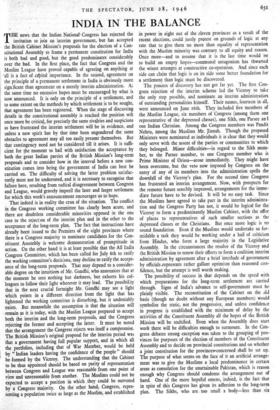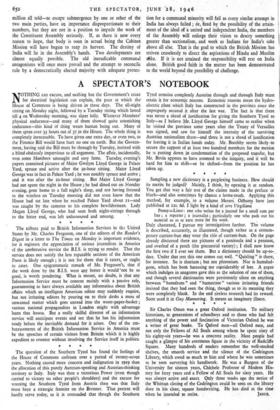INDIA IN THE BALANCE
THE news that the Indian National' Congress has rejected the invitation to join an interim government, but has accepted the British Cabinet Mission's proposals for the election of a Con- stitutional Assembly to frame a perthanent constitution for India is both bad and good, but the good predominates considerably over the bad. In the first place, the fact that Congress and the Muslim League have proved capable of agreeing on anything at ' all is a fact of capital importance. In the second, agreement on the principle of a permanent settlement in India is obviously more significant than agreement on a merely interim administration. At the same time no excessive hopes must be encouraged by what is now announced. It is only on the principle of a settlement, and to some extent on the methods by which settlement is to be sought, that agreement has been registered. When the stage of discussing details in the constitutional assembly is reached the position will once more be critical, for precisely the same rivalries and suspicions as have frustrated the interim settlement will be in evidence, and unless a new spirit has by that time been engendered the same obstacles to agreement may all too easily present themselves. But that contingency need not be considered till it arises. It is suffi- cient for the moment to hail with satisfaction the acceptance by both the great Indian parties of the British Mission's long-term proposals and to consider how in the interval before a new con- stitution comes into being the government of India can best be carried on. The difficulty of solving the latter problem satisfac- torily must not be underrated, and it is necessary to recognise that failure here, resulting from radical disagreement between Congress and League, would gravely imperil the later and larger settlement for which this week's announcement encourages us to hope.
That indeed is in reality the crux of the situation. The conflict in the Congress working committee has clearly been acute, and there are doubtless considerable minorities opposed in the one case to the reject:on of the interim plan and in the other to the acceptance of the long-term plan. The fact that instructions have already been issued to the Premiers of the eight provinces where there is a Congress majority to nominate candidates for the Con- stituent Assembly is welcome demonstration of promptitude in action. On the other hand it is at least possible that the All India Congress Committee, which has been called for July 6th to ratify the working committee's decisions, may decline to ratify the accept- ance of the long-term proposals. That may depend to a consider- able degree on the intuitions of Mr. Gandhi, who announces that at the moment he sees nothing but darkness, but exhorts his col- leagues to follow their light wherever it may lead. The possibility that in the next crucial fortnight Mr. Gandhi may see a light which points in a different direction from the light that has lightened the working committee is disturbing, but it undeniably exists. But meanwhile the assumption is that the situation will • remain as it is today, with the Muslim League prepared to accept both the interim and the long-term proposals, and the Congress rejecting the former and accepting the latter. It must be noted that the arrangement the Congress rejects was itself a compromise.
The British Mission's original proposal for the interim period was that a government having full popular support, and in which all the portfolios, including that of War Member, would be held by " Indian leaders having the confidence of the people " should be formed by the Viceroy. The understanding that the Cabinet to be thus appointed should be based on parity of representation between Congress and League was reasonable from one point of view and unreasonable from another. The Muslims could not be expected to accept a position in which they could be outvoted by a Congress majority. On the other hand, Congress, repre- senting a population twice as large as the Muslim, and established in power in eight out of the eleven provinces as a result of the recent elections, could justly protest on grounds of logic at any rate that to give them no more than equality of representation with the Muslim minority was contrary to all equity and reason. Once more—and to assume that it is the last time would be to build on empty hopes—communal antagonism has thwarted the wisest attempts at constructive co-operation. And since each side can claim that logic is on its side some better foundation for a settlement than logic must be discovered.
The process of discovery has not got far yet. The first Con- gress rejection of the interim scheme led the Viceroy to taki the only step possible, and nominate an interim administration of outstanding personalities himself. Their names, fourteen in all, were announced on June z6th. They included five members of the Muslim League, six members of Congress (among them one representative of the depressed classes), one Sikh, one Parsee an one Indian Christian. Among the Congress members was Pandit Nehru, among the Muslims Mr. Jinnah. Though the proposed Ministers were nominated as individuals it is clear that they would only serve with the assent of the parties or communities to which they belonged. Minor difficulties—in regard to the Sikh mem- ber, to the Parsee member, to one Congress member who is Prime Minister of Orissa—arose immediately. They might have been overcome, but the veto now imposed by Congress on the entry of any of its members into the administration spells the downfall of the Viceroy's plan. For the second time Congress has frustrated an interim arrangement. Now, with prospects for the remoter future sensibly improved, arrangements for the imme- diate future have to be devised. It will be no easy task. Since the Muslims have agreed to take part in the interim administra- tion and the Congress Party has not, it would be logical for the Viceroy to form a predominantly Muslim Cabinet, with the offer of places to representatives of such smaller sections as the depressed classes or the Christians. But once more logic is no sound foundation. Even if the Muslims would undertake so for- midable a task they would be working under a hail of criticism from Hindus, who form a large majority in the Legislative Assembly. In the circumstances the resolve of the Viceroy and the British Mission to renew their efforts to form a coalition interim administration by agreement after a brief interlude of government by officials represents rather gallant optimism than reasoned con- fidence, but the attempt is well worth making.
The possibility of success in that depends on the speed with which preparations for the long-term settlement are carried through. Signs of India's advance to self-government must be plainly visible. The reconstitution of the Cabinet on the old basis (though no doubt without any European members) would symbolise the static, not the progressive, and unless confidence in progress is established with the minimum of delay by the activities of the Constituent Assembly all the hopes of the British Mission will be stultified. Even when the Assembly does start work there will be difficulties enough to surmount. In the Con- gress debates strong exception was taken to the grouping of pro- • vinces for purposes of the election of members of the Constituent Assembly and to decide on provincial constitutions and on whether a joint constitution for the provinces•concerned shall be set up.
The purpose of what seems on the face of it an artificial arrange- ment was to give the Muslims a local predominance in certain areas as consolation for the unattainable Pakistan, which is reason enough why Congress should condemn the arrangement out of hand. One of the more hopeful omens, indeed, is the fact that in spite of this Congress has given its adhesion to the long-term plan. The Sikhs, who are too small a body—less than six million all told—to escape submergence by one or other of the two main parties, have an importance disproportionate to their numbers, but they are not in a position to impede 'the work of the Constituent Assembly seriously. If, as there is now every reason to hope, that body is soon in actual being the Cabinet Mission will have begun to reap its harvest. The destiny of India will lie in the Assembly's hands. Two developments are almost equally possible. The old ineradicable communal antagonisms will once more prevail and the attempt to reconcile rule by a democratically elected majority with adequate protec- tion for a communal minority will fail as every similar, attempt in India has always failed ; or, fired by the possibility of the attain- ment of the ideal of -a united and independent India, the members of the Assembly will enlarge Mei': vision to descry something greater than sectionalism, and work as Indians for India's sake above all else. That is the goal to which the British Mission has striven ceaselessly to direct the aspirations of Hindu and Muslim Ake. If it is not attained the responsibility will rest on India alone. British good faith in the matter has been demonstrated to the world beyond the possibility of challenge.































 Previous page
Previous page